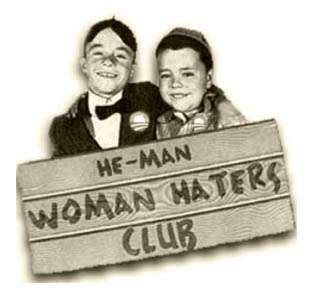Why So Many Men Who Hate Women Love Limited Government
Small-government sentiment makes sense in anti-women communities, but that has nothing to do with libertarianism at large.


As evidence of claims that libertarianism holds little appeal for women, critics like to highlight limited-government cheerleading from groups or figures known for sexism, especially men's rights activists (MRAs) and their various offshoots (Gadsden flags in the Twitter profiles of #GamerGate fans are seen as very telling). While they're wrong that libertarian philosophy is somehow inherently hostile to women, it's hard not to notice that a lot of dudes who don't take well to women's autonomy are also drawn to viewpoints that might be described as crudely libertarian.
The most recent instance of this to catch my eye comes from Vice, where Mack Lamoureux profiles a group calling themselves the Men Going Their Own Way (MGTOW), or "mig-tows." Along with standard MRA views—feminists have destroyed the rightful social order, men are the ones truly discriminated against today, etc.—the community subscribes to a four-part "Levels of MGTOW," the first and second of which involve ditching romantic, social, and sexual relationships with all women. The third step is economic disengagement, in which one "refuses to earn more money than is necessary for sustaining life" because government is "tyrannical" and one must "actively drain money from the bureaucrats." The fourth step is wide-scale societal disengagement. The founders of the MGTOW community—or "Red Pill," as it is now more commonly known—said in an early mission statement the group's goal is to instill "masculinity in men, femininity in women, and work toward limited government!"

Endorsing limited government in some areas doesn't necessarily make one a libertarian, of course. Libertarianism as a political philosophy is about much more than a sort of generalized anger at "Big Government," or any specific proposal for disabling or disengaging from it—not every Tea Partier is libertarian, nor every misogynist with a Walden complex.
But to the extent that a lot of resentment toward women is bred out of men's dissatisfaction with their current lot in life, it makes sense that these men would also be angry at the government. The misogynist mindset centers on irrationally blaming women for all men's problems, so casting blame on another outside group—the government, the rich, immigrants, big business, some other race—isn't really a stretch. And of all these targets, the government actually makes the most sense if we're talking about bearing (some) responsibility for unemployment and other economic issues men face.
In general, MRA lists of the ways women allegedly screw men over tend to feature alimony, child support, custody battles, campus sexual assault policies, and domestic violence law prominently—all areas where the state is a strong actor. Some of these policies, like men not beating up their wives without breaking the law, are just fine as is. But others could use a significant scrubbing of sexist precepts. In other words, the "manosphere" isn't always wrong to pinpoint the government as a locus of their problems.
The bottom line, however, is that while libertarian-leaning sentiment makes sense among the He Man Woman Hating club and your run-of-the-mill MRAs, there's nothing in libertarianism as a political philosophy that is inherently sexist or misogynistic. Contra Salon-esque stereotypes, libertarians do not actually believe that survival of the fittest is a policy goal. Nor is it sufficient to say things like: But you guys don't want to raise the minimum wage, and the majority of minimum-wage earners are women! Disagreements over how best to help women, the economy, and all people in poverty do not mean libertarians hate women, the economy, and people in poverty.
But just as libertarianism alone cannot answer the abortion question (those who shout "Non-Aggression Principle!" about fetuses already assume a lot outside the realm of libertarianism, such as when personhood begins), libertarianism as a political philosophy does not and cannot dictate personal views of gender norms. That's why there's room for both feminists and sexists in libertarianism. As long as you believe in equality of the sexes before the law, that's all that really matters.
Of course, a lot of both MRAs and liberal feminists stop short of really believing this when it's not in their group's perceived interest. That's why most fail to pass a libertarian smell test even if they do espouse limited-government leanings in some arenas (and, of course feminists do as much as any MRAs when it comes to certain subjects, like reproductive freedom). In my personal experience, libertarianism can appeal to MRAs and feminist-minded folks alike because it's based on protecting people's basic rights regardless of who they are, and getting rid of government policies that infringe on liberty whomever they hit hardest. But libertarians must reject encoding any particular set of beliefs—religious, ideological, or otherwise—into the law. And for people on all sides of sex- and gender-issue debates, that's often a bridge too far no matter how much they want to limit the government's involvement with their wallet or workplace hiring practices or uterus.


Show Comments (855)